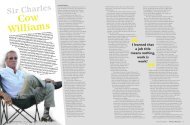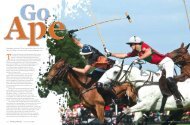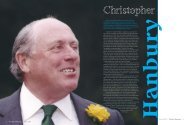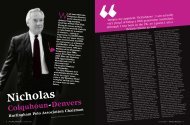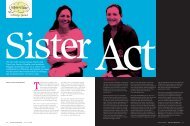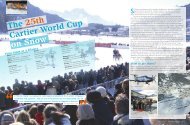Polo Mag Combined-3-53:Layout 1 - The Polo Magazine
Polo Mag Combined-3-53:Layout 1 - The Polo Magazine
Polo Mag Combined-3-53:Layout 1 - The Polo Magazine
You also want an ePaper? Increase the reach of your titles
YUMPU automatically turns print PDFs into web optimized ePapers that Google loves.
8 | THE POLO MAGAZINE | AUTUMN 2008
David<br />
Woodd<br />
David Woodd is known to the polo community as the Chief Executive<br />
of the Hurlingham <strong>Polo</strong> Association. He has held this esteemed post<br />
since 1999 and of course is a regular fixture at polo nationwide as a<br />
result. We met with David at the HPA offices to talk a bit more about<br />
the man behind the role.<br />
So, we found out that he was a career soldier, reaching the rank<br />
of Colonel in the Army and has travelled around the world as a result.<br />
Having played polo throughout adulthood in the forces in some<br />
far-flung locations he reached a handicap of 4 goals (he is the second<br />
highest handicapped player in recent army history). He lives in<br />
Faringdon with his wife, Fra and two teenage daughters, who also<br />
now play polo.<br />
In our lengthy interview we did get his views on polo politics,<br />
handicapping, umpiring, pro-am and so much more, but we decided<br />
that maybe that polo-based content will be included in another issue<br />
of <strong>The</strong> <strong>Polo</strong> <strong>Mag</strong>azine – for now we just wanted to let our readers find<br />
out more from David himself.<br />
“My family rode and because of this I was made to ride as a child, which,<br />
of course I loved. I started in the Ashford Valley Pony Club, with lots and lots<br />
of trotting around in circles and hopping over little jumps. My father always rode<br />
and, like me, was in the Army – he too was in the 14th/20th King’s Hussars.<br />
He played polo and reached four goals, although the Second World War was<br />
pretty much the end of his polo career. He was much older than<br />
most fathers, so by the time us children came along that was pretty much that.<br />
<strong>The</strong>re was not a great deal of polo in Kent when we were young, my father and<br />
some other parents did try to get polo going at Ashford Valley PC, but I recall a<br />
very fierce woman in charge who would not have any of it, so I didn’t really start<br />
until later when I joined the Army.<br />
In fact, it wasn’t until I started the second year of my officer training at<br />
Sandhurst that I got immersed in the game. We used to go off to Tidworth and<br />
play one or two chukkas if we were lucky, then drive all the way back to Sandhurst.<br />
I was pretty unpopular as I dropped out of the cricket XI for my second year.<br />
But, apart from my father’s connection with polo, I also recognised fairly early on<br />
that cricket would take all day, whereas polo was all over pretty quickly – and well,<br />
it was just more fun! Also, with cricket you’d have to travel down to somewhere<br />
like Portsmouth to play the Navy, travelling down the day before and staying the<br />
night – it was all pretty boring really.<br />
I rode quite a lot at Sandhurst, especially as I whipped in for the drag hunt, and<br />
I was very lucky to be really put through my paces by Tarjic Kopansky, a Company<br />
Commander whilst I was there. He wanted me to take up eventing but my father<br />
was horrified, I remember him saying: “<strong>The</strong>re are three things an officer should<br />
never be involved with: buggery, morris dancing and show jumping” and so I<br />
stayed well clear of that!<br />
<strong>The</strong> polo at Tidworth was very relaxed; I don’t think anyone particularly gave<br />
lessons, you were just plonked on and got on with it. It was all very informal – if<br />
you had two ponies you were thought of as quite smart; if you had three, you<br />
were clearly a pretty big wheel. Let’s just say I had a very exciting summer of ten<br />
chukkas maximum.<br />
AUTUMN 2008 | THE POLO MAGAZINE | 9
10 | THE POLO MAGAZINE | AUTUMN 2008<br />
From Sandhurst I was stationed in Hong Kong<br />
where they had a great system in operation.<br />
You put your name on a list and the next pony that<br />
became available (because somebody had been<br />
posted away etc) was yours – whatever it was.<br />
<strong>The</strong>y cost £30 and then £7 to keep a month.<br />
You were only allowed one pony and they were<br />
usually these little tough Borneo ponies – absolute<br />
little buggers with no shoes on! I remember one<br />
stallion in particular that you really didn’t want to get<br />
near in the line up. I suppose we played enough to<br />
learn the rules and still have fun.<br />
<strong>The</strong>n I was sent to Germany, with my brother,<br />
who was in the same Regiment. We bought a pony<br />
each and would decide which of us would play<br />
each week.<br />
When I arrived in 1973, I was still minus<br />
two and it was from then that I started to play<br />
properly: I mean I could ride having done a bit of<br />
hunting as a child and of course those Pony Club<br />
forays, but as for polo – let’s just say there was<br />
definitely no chance of me passing the Junior HPA<br />
tests back then! <strong>The</strong> standard in Germany was<br />
pretty good and there were quite a few decent two<br />
and three goalers around. It was all organised in a<br />
very Regimental way by Peter Vickery and at the<br />
same time Hugh Dawnay was cruising around the<br />
place telling us what to do. It really was a great time<br />
though, one I remember with great fondness;<br />
tournaments were run over a Friday to Sunday.<br />
Friday night would be a grooms’ bbq, Saturday night<br />
was the officers’ dance and come Sunday you had<br />
no idea where the ponies had come from!
<strong>The</strong>re are three things an Officer<br />
should never be involved with:<br />
buggery, morris dancing<br />
and show jumping<br />
<strong>The</strong>y were invariably stabled at the various<br />
polo clubs but I think it always felt a bit touch and go<br />
as to where you were going to be…I remember<br />
turning up to Düsseldorf still in the previous<br />
night’s dinner jacket, hoping to God the horses<br />
were going to turn up, which isn’t great by today’s<br />
standards is it?<br />
Anyway, in 1976 I returned to the UK with the<br />
Regiment to run Tidworth <strong>Polo</strong> Club, I think at that<br />
stage I was playing off a handicap of one or two.<br />
I oversaw the building and design of the 3-Day<br />
Event course and then went on to run the polo.<br />
<strong>The</strong> Club was annexed to the army and everything<br />
used to belong to them and was paid for by<br />
Her Majesty. I was the <strong>Polo</strong> Manager with two<br />
soldiers helping me to run the stables and so on,<br />
so I was very much working for the Army, but I<br />
didn’t have to put on uniform, which you could do<br />
in those days. Whilst I was at Tidworth, of course I<br />
played polo, as much as the three horses I had<br />
brought back from Germany would allow me to.<br />
<strong>Polo</strong> was very much army-based and that had<br />
its advantages because we all knew exactly where<br />
we had to be throughout the year, so there was a<br />
real structure to it all. By that, I mean we couldn’t<br />
have training until late September when the harvest<br />
was finished and we were able to drive tanks across<br />
the farmland again; so you knew you had a summer<br />
relatively free for polo. We tended to move around<br />
the country a lot; a weekend in Hamburg, a<br />
weekend in Munich and so on. It was a bit like a<br />
travelling circus, where everyone wanted to make<br />
the weekend they were hosting bigger and better<br />
than the one before. No one seemed too<br />
bothered about who won or lost, although it was<br />
always an incentive to qualify for a later game on<br />
the Sunday to allow time to recover from Saturday<br />
night’s excesses!<br />
After running Tidworth, in 1980 I returned to<br />
Germany. Despite the time spent in the country,<br />
I don’t speak much of the language; I can say:<br />
“Can I park my tank in your garage?”– although<br />
I’m not 100% sure what that means innuendo-wise<br />
– and luckily I don’t think I ever had to use it!<br />
During my posting in Germany I got to travel a<br />
great deal too, particularly during the winter, so I’ve<br />
played in America, Kenya and Brunei to name but<br />
a few. Luckily I managed to steer clear of the<br />
Falklands (although I have been there subsequently<br />
to the crisis). I have particularly fond memories of<br />
Zim’ in 1983 where I was stationed for seven<br />
months – I travelled out there with the British<br />
Military Training Team. Many people were very kind<br />
to me and I played a great deal of polo too – it was<br />
after playing there that I was put up to four goals.<br />
I returned to England, to go to Staff College and<br />
whilst there met, and married, Fra. I played out of<br />
Guards for the next five seasons whilst in the MoD<br />
and at Catterick; it was quite a long commute but<br />
I had a very tolerant Commanding Officer.<br />
After another two stints in Germany, I returned to<br />
England in 1994, but by ‘95 I’d all but given up.<br />
By then we were living in Oxfordshire and<br />
Kirtlington was the local club. I think that last season,<br />
Fra came to watch me twice and even then had to<br />
leave early with the children. Also I was running out<br />
of ponies and I would’ve had to start looking at<br />
investing in new ones – also my excellent,<br />
long-standing groom, Ian Kennedy, who had<br />
worked for Memo [Gracida] was off to<br />
New Zealand, so it just seemed like a good point<br />
to finish. No horses, no groom, young children,<br />
wife not that interested – why bother I thought.<br />
Actually, fast forward a couple of years and I’d got<br />
the HPA post and the children were playing, so it<br />
turned out that I wasn’t out of it for longafter all.<br />
So my daughters Tilda and Tabba started<br />
playing when they were about eight years old, a<br />
couple of years after I’d finally hung up my sticks,<br />
so I thought. I have fond(ish) memories of charging<br />
about on foot, leading them as I’d given up riding at<br />
that stage. But inevitably enough, I could not keep<br />
away from the saddle, or the polo sticks, for long<br />
and as the girls improved it seemed they were<br />
having too much fun not to join in. Now I play<br />
occasionally, mainly with them at home but<br />
sometimes in tournaments where we can play<br />
together (that’s if they can’t find anyone else and<br />
don’t need my ponies) or when we are on holiday<br />
in Argentina.<br />
All my ponies had pretty much gone. I kept a<br />
couple of the old ones in retirement – I remember<br />
receiving a postcard when I was away, in which<br />
Fra said that one of the old-timers, Doug, was<br />
playing polo somewhere. I thought: “Bloody hell,<br />
what’s Fra doing letting old Doug out on the field?”<br />
<strong>The</strong>n of course I realised that she meant he was<br />
playing polo in the sky – it was a sad moment.<br />
We still do have one of my old ones who the girls<br />
AUTUMN 2008 | THE POLO MAGAZINE | 11
12 | THE POLO MAGAZINE | AUTUMN 2008<br />
have got back into work, he’s 26 and loves every minute of chukkas, but we won’t let him off the<br />
farm – he has to die at home if anywhere you see!<br />
I then went on to the Joint Staff College, and later, the High Command and Staff Course, which is<br />
meant to be your ticket to getting to the top; I then went on to the Royal College of Defence Studies.<br />
It was a very civilised affair, based in Belgrave Square, where you started at eleven and finished at one.<br />
From there, you are meant to go on to be a General; but I was married and by that<br />
stage we had two daughters and were based on the farm here at Faringdon. It was at that point<br />
that I had an interview with our ‘manning’ people who told me that I probably was not going to<br />
be a General, which came as no surprise, and that if I wanted to be promoted I may have to think about<br />
returning to Germany or even the Falklands, which met with a rather muted response from me<br />
and the family. <strong>The</strong>n they proposed a posting to Lancashire and again I replied with a lack of<br />
enthusiasm for the move. Fra, the children and I had all we wanted in Little Coxwell and I<br />
wasn’t prepared to start yanking them out of school and on to a new life.<br />
Also, frankly I don’t think Mrs Woodd would have come with me and I’m not a very good cook!
Easter 1986 – RAF team tour to Jordan &<br />
Cyprus. From L to R: John Gates, David, David<br />
Walton-Masters, David Wildridge<br />
1980, Hamberg – Alexander Schwartz, Calou Gallardo,<br />
Klaus Gehaar & David<br />
1982, Germany – Peron, David & Dietmar Kirsch<br />
1993 – with President George HW Bush<br />
1987 Finalists of the Royal Windsor.<br />
Will Lucas in possession of the ball<br />
challenged by David at No.1 for Sladmere.<br />
Unfortunately they lost to Brent Walker<br />
but went on to win the Harrison<br />
County Cup<br />
1989 – Windsor team in St Moritz<br />
<strong>The</strong>re were not many positions vacant in Oxfordshire, so it was good timing to hear from Buff Crisp at<br />
the HPA.<br />
Buff had approached me previously about the HPA Chief Executive job and then I heard from him<br />
again in 1999. I think the position had got too big and he was getting older and a bit grumpy – a bit<br />
like me now! I know there were quite a few applicants, but I think there were about four or five<br />
who were the serious contenders. Some had no polo background, not that that needs to be a<br />
handicap – just look at [Andrew] Tucker he’s doing a fantastic job [with the England team] without a<br />
polo background. So, anyway, I was delighted to get the job, bearing in mind the mooted postings<br />
to Germany or Lancashire – but then there was a bit of a panic on, as the Army wouldn’t release me<br />
due to the fact that they wanted a better return on their investment. At that stage, I was actually on the<br />
staff at the new Joint Staff College which, rather ironically was about to move to Shrivenham,<br />
2 miles from here at Faringdon. Anyway, we had to rush through an appeal and luckily things turned out<br />
in my favour and to cut a long story short, I became the Chief Executive of the HPA in 1999. <strong>The</strong> rest,<br />
as they say, is history!<br />
May 1985 – David played back<br />
for Alfursan to win the Rodney<br />
Moore Cup<br />
1979 – Inter Regimental Winners, David with Gerry Maylor<br />
1982, Washington – David Woodd, Jack Shed,<br />
Jasmine & Ian Forbes-Cockell, Maragret Heckler,<br />
Nigel & Bumble Haddon-Paton & entourage<br />
AUTUMN 2008 | THE POLO MAGAZINE | 13



